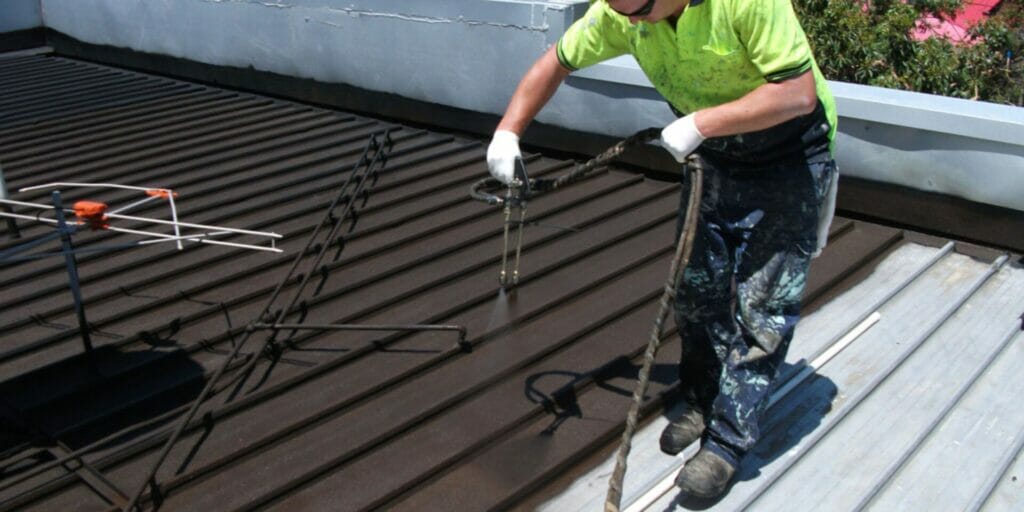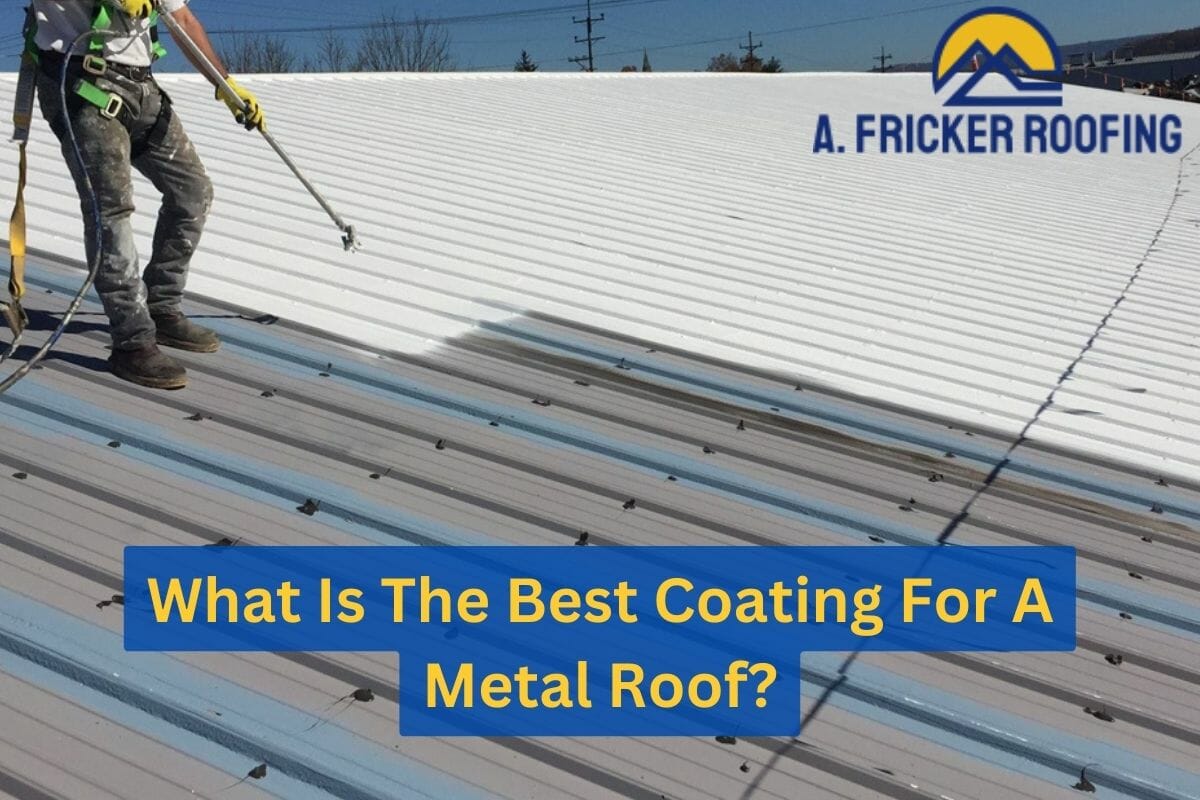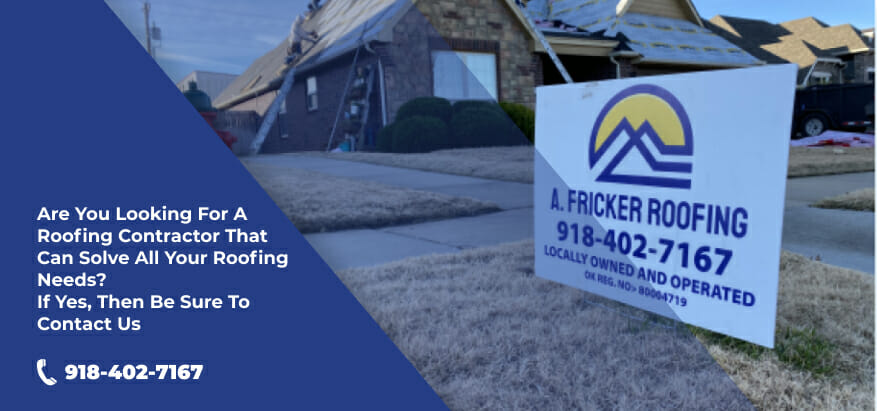Though metal roofs are durable, rust-resistant, reflective, and energy efficient, many common problems still occur with these roofs over time. If damage goes unnoticed and untreated, these problems lead to many issues, making you pay a higher price at once for repair or replacement. By applying a suitable coating, a homeowner can eliminate persisting issues and give their metal roof a new life.
Since many roof coatings are available on the market, choosing the right one for your metal roof can be difficult. But no worries, we’re here to help. Read this blog post to make a well-informed decision when buying the best coating for metal roofs.
Types of Metal Roof Coatings
Acrylic Coatings
Thermal expansion is a common occurrence with metal roofs. When metal roofs are in direct contact with extreme temperature fluctuations like hot days and cold nights, they expand or contract in response. This thermal expansion and contraction of a metal roof results in many problems, including nail pops that can result in water leaks, rust formation, and corrosion. Hence, metal roofs require a flexible coating that can expand and contract with the metal roof, helping to prevent damage.
An acrylic coating is a polymer-made and fast-drying material that fills gaps, increasing a metal roof’s energy efficiency. It’s known for its flexibility and durability, along with great UV and weather resistance.
Silicone Coatings
The top choice for coating metal roofs is silicone roof coatings, especially for those exposed to harsh weather conditions. Contractors prefer it for its ease of installation and low maintenance, although its cost is higher due to its physical attributes such as water and weather resistance, UV radiation protection, and heat reflectivity.
Silicone coatings are also commonly used for commercial roofs since they promote durability and prolong the roof’s lifespan. They enable metal roofs to expand and contract according to temperature changes. Additionally, the coating typically comes with a 10 to 20-year warranty.
Our blog post on the best coatings for commercial roofs will help you make a well-informed decision if you’re shopping for commercial roof coatings.
Elastomeric Coatings
When properly applied, elastomeric coatings can provide years of effective protection for metal roofs. Elastomeric roof coatings are popular for metal roofs because they are highly flexible and can expand and contract with the metal. This helps prevent cracks and other damage that can occur when metal roofs are exposed to extreme temperatures. Elastomeric coatings are also highly effective at preventing water damage and providing protection against UV radiation.
Bitumen-Based Coatings
Bitumen-based coatings are a popular option for protecting metal roofs from the elements. Bitumen is a petroleum-derived material that is well-known for its waterproofing properties, making it an ideal choice to use on roofs. These coatings create a watertight seal on metal roofs, which protects them from rain, snow, and other forms of moisture.
Additionally, these coatings are also durable, weather resistant, and can withstand extreme heat and cold conditions. Finally, bitumen coatings are easy to apply and cost-effective, making them a great choice for those looking to protect their metal roofs without breaking the bank.
Properties Of An Effective Coating For Metal Roofs
Metal roofs can develop issues that may be expensive for you to deal with. Therefore, the best roof coating is the coating that protects from all forms of damage.

Durability
The roof coating you choose must meet the purpose of applying them, and durability is one of the important factors homes and business owners seek. When buying a roof coating for roofs, particularly metal roofs, you should only choose the most durable coatings. Although metal roofs are made of durable materials, including steel and aluminum, adverse weather conditions can still damage them. So, in that case, only durable coatings help prevent them from weather damage.
Corrosion Resistance
Since metal roofs are naturally susceptible to corrosion and rot, corrosion resistance is particularly important to look for in a roof coating. Applying a coating that doesn’t resist corrosion and allows rust to form isn’t worth your money.
Waterproofing
One of the main advantages we seek from applying a roof coating is water resistance. Ponding water or accumulated snow is damaging to metal roofs. They increase the rate of rust formation on metal surfaces, fading their colors and causing them to deteriorate. Therefore, the coatings you intend to apply must be inherently water resistant, which will prevent the metal roof from the adverse effects of ponding water.
UV Resistance
Though metal roofs are highly reflective, UV radiation still affects the roofing material as it has a thin thickness. So, therefore, the coating you buy must be able to withstand harmful and intense UV rays.
Flexibility
As also discussed above, metal roofs tend to experience thermal expansion, causing nails to pop up and the metal panels to move, which can create gaps for water to seep through. So, the coating you purchase should have flexibility that’s able to keep the metal sheets intact and fastened to the roof deck. Elastomeric coatings are the best fit for this purpose.
Adhesion
Having a roof coating that strongly adheres to the roof deck is important. With so many coatings on the market, it can be hard to trust which one will adhere the best to a metal roof. Generally, look for a coating that’s been tested to meet adhesive standards. You should also allow the coating to dry for 24 hours, or longer depending on the type of coating, to ensure that it’s fully adhered to the roof.
Low Maintenance
Low maintenance is an important property for metal roof coatings. A coating that requires minimal maintenance can help reduce the overall cost of maintaining the roof and the amount of time and effort required to keep the roof in good condition.
Factors To Consider When Choosing A Coating
The following factors will greatly affect the coating you buy, so ensure you consider them before making your purchase.
Type Of Metal Roof
One of the most important factors is the type of metal roof you have. Different types of metal roofs may require different types of coatings and choosing a coating compatible with your particular type of metal is important. Also, to ensure you buy the best coating for a metal roof, make sure that its lifespan is compatible with your roof.
Climate And Weather Conditions
As the climate and weather conditions greatly impact your roof, it’s important to consider this factor when buying a coating for the metal roof. If your roof is exposed to harsh weather conditions, such as heavy rain, snow, or high winds, you’ll want to choose a coating that provides good water resistance, durability, and UV resistance.
How To Apply Metal Roof Coatings
It is essential to take proper safety measures when you start coating your metal roof.
Preparation Steps
As metal roof coatings are only meant to adhere to dry surfaces, preparing the roof before applying any type of coating is essential. By not doing so, or if the surface is wet or damp, the coating will not form a strong bond.
Application Techniques
When it comes to application techniques, the specific method will depend on the type of coating being used. Some coatings can be applied using a spray gun, while others may be applied with a roller or brush. It’s important to follow the manufacturer’s instructions for the specific coating being used, to ensure it’s properly applied.
Safety Considerations
Safety considerations are also important when applying metal roof coatings. Wearing appropriate protective gear, such as gloves, safety glasses, and a respirator, is important when handling and applying coatings.
Are You Ready To Give Your Roof An Additional Protective Layer?
In order to ensure that your roof coating is applied correctly, and will provide you with the maximum benefits, hire a qualified and experienced roofing contractor to do the job. Call the team at A. Fricker Roofing and Waterproofing today at (918) 402-7167 to maximize your metal roof’s efficiency.

